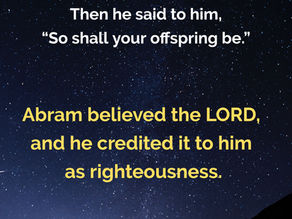Psalm 90 - Moses' Model Prayer
- Chad Werkhoven
- May 9, 2025
- 6 min read
Make sure asking God to remind you of His wrath is at the top of your list.
BOOK IV
Psalms 90–106
Psalm 90
A prayer of Moses the man of God.
1 Lord, you have been our dwelling place
throughout all generations.
2 Before the mountains were born
or you brought forth the whole world,
from everlasting to everlasting you are God.
3 You turn man back to dust,
saying, “Return to dust, you sons of men.”
4 A thousand years in your sight
are like a day that has just gone by,
or like a watch in the night.
5 Yet you sweep people away in the sleep of death—
they are like the new grass of the morning:
6 In the morning it springs up new,
but by evening it is dry and withered.
7 We are consumed by your anger
and terrified by your indignation.
8 You have set our iniquities before you,
our secret sins in the light of your presence.
9 All our days pass away under your wrath;
we finish our years with a moan.
10 Our days may come to seventy years,
or eighty, if our strength endures;
yet the best of them are but trouble and sorrow,
for they quickly pass, and we fly away.
11 If only we knew the power of your anger!
Your wrath is as great as the fear that is your due.
12 Teach us to number our days,
that we may gain a heart of wisdom.
13 Relent, Lord! How long will it be?
Have compassion on your servants.
14 Satisfy us in the morning with your unfailing love,
that we may sing for joy and be glad all our days.
15 Make us glad for as many days as you have afflicted us,
for as many years as we have seen trouble.
16 May your deeds be shown to your servants,
your splendor to their children.
17 May the favor of the Lord our God rest on us;
establish the work of our hands for us—
yes, establish the work of our hands.
Canons of Dordt
Point 2 - Limited Atonement
Article 1: God’s Right to Condemn All People
Romans 5:12-14 - Mis-Markmanship
Deuteronomy 28:15-20 - Not A Tame Lion
Luke 15:11-16 - Prodigious Deprivation
Psalm 143 - Aggressive Prayer Pattern
Article 2: The Manifestation of God’s Love
Zephaniah 3:14-17 - The Mighty Warrior Who Saves
Lamentations 3:19-23 - Great Is Thy Faithfulness
Article 3: The Preaching of the Gospel
1 Timothy 2:1-7 - God Our Savior
Rom 10:14-17 - The Power of Preaching
1 Cor 1.23-24 - God's Foolishness
Psalm 93 - Mightier Than Chaos
Article 4: A Twofold Response to the Gospel
John 6:37-40 - Tensegral Theology
John 12:42-50 - Buffet Theology
Article 5: The Sources of Unbelief and of Faith
James 1:13-18 - The Devil (didn't) Make You Do It
Ecclesiastes 7:25-29 - Many Schemes
Ephesians 2:8 - The Gift of God
Psalm 95 - The LORD is OUR God
Article 6: God’s Eternal Decree
Ezekiel 36:24-27 - A Whole New Reality
Romans 9:15-21 - God's Mercy, Not Your Effort
2 Thessalonians 2:10-12 - Love The Truth
Article 7: Election
Ephesians 1:3-6 - Before the Foundation
Deuteronomy 7:1-10 - Set Apart
John 17:1-5 - Sovereign Submission
Psalm 115 - God Does What He Pleases
Article 8: A Single Decree of Election
Romans 4:1-8 - One and the Same
Romans 4:9-17 - Chicken or Egg?
Romans 4:18-25 - Faithfully Face the Facts
Hebrews 11:39-40 - Promises Kept
Psalm 33 - God's Control, Authority & Presence
Article 9: Election Not Based on Foreseen Faith
2 Timothy 1:7-10 - Passive & Powered
Deuteronomy 9:4-6 - You're Not That Awesome
Psalm 91 - The Shelter of the Most High
Article 10: Election Based on God’s Good Pleasure
Luke 2:13-14 - Christmas in March
Galatians 4:1-7 - From Slave to Son
1 Peter 2:9-10 - You're The Best Thing God Has!
Article 11: God’s election is unalterable.
Malachi 3:6-7 - Keep It Simple
Hebrews 6:13-20 - Unchanging Anchor
Hebrews 13:1-8 - Keep On Loving
Hebrews 6:13-20 - Unchangeable Blessing
Article 12: The Assurance of election
Hebrews 11:1-6 - Confident Assurance
Malachi 3:14-18 - Childlike Fear
2 Corinthians 7:8-11 - Godly Sorrow
Psalm 65 - The Hearer of Prayers
Article 13/14: The Fruit of our assurance
Isaiah 57:14-21 - God's Second Residence
2 Peter 1:3-10 - Make Every Effort
Isaiah 42:1-9 - The Sovereign & His Servant
Article 2: The Satisfaction Made by Christ
Since, however,
we ourselves cannot give this satisfaction [required by God's justice]
or deliver ourselves from God’s wrath,
God in boundless mercy has given us as a guarantee
his only begotten Son,
who was made to be sin and a curse for us,
in our place, on the cross,
in order that he might make satisfaction for us.
Summary
We've already noted this year that the Psalter (the book of Psalms) is divided into five sub-books, and that the first psalm in each book sets the tone for the psalms that follow it. Not only is this 90th psalm unique in that it is the only psalm attributed to Moses, but it begins this new section of psalms focused on the eternal kingship of the LORD.
Moses recognizes what we've been so focused on this year as we've read the Bible together: God's sovereignty - that is, His control, authority and presence in and over all things. Moses begins his prayer by acknowledging God's timeless immutability (unchangeableness): the Lord has been our dwelling place throughout all generations. He notes that God's existence predates the birth of the mountains - indeed it was God who brought forth the whole world!
The psalm's second stanza (v3-11) is the alignment section of Moses' prayer (there's a big lesson just in the fact that the longest part of the prayer is focused on Moses aligning himself with God's will!) In it he masterfully demonstrates how to hold the tension between the reverent worship expressed in the opening verses and the outright fear of God that the Bible so often calls us to.
As he prays, Moses is reminded that God turns man back to dust, that He sweeps people away in death, that we are consumed by God's anger and terrified by His indignation and that all of our iniquities and secret sins are set before the light of God's presence. Moses here realizes that God is so much more than a grandfatherly presence in the sky smiling upon our mischief. All our days, Moses prays to God, pass away under your wrath.
Dig Deeper
For the last century there's been an unwritten rule promoted by self appointed evangelism experts that talking about sin and the wrath of God is the antithesis of church growth. People only want to hear about God's love, mercy and generous providence, so that's what our songs, sermons and prayers ought to be focused upon.
But Moses completely contradicts such advice. It's to our benefit to be reminded of the power of God's anger and that His wrath is consistent with the fear due Him (NET)! Moses here knows that if people remain ignorant of God's wrath and anger, they'll ask Him for all the wrong things and inevitably be left to face God's anger on their own.
The things Moses does ask God for in his prayer seem like the things most people ask for when they pray: for satisfaction, gladness, and God's favor to rest upon us. We see so many biblical prayers that ask for these things, and so clearly it is good to ask God for these things in your own prayers as well.
But frame these requests the same way Moses does by first asking God to relent from His righteous anger and to have compassion on His servants. When you're continually reminded of what your sins deserve from our Holy God, it will be natural for you to pray this way. And you can confidently do so, knowing that (as the Canons put it) although you cannot deliver yourself from God’s wrath, that you have been freed from it because Christ has made full satisfaction for your sin.
ACKNOWLEDGE WHO GOD IS: Our Father, our dwelling place throughout all generations;
ALIGN YOUR LIFE WITH GOD'S WILL: Recognize and even fear God's righteous anger and wrath as you pray;
ASK GOD FOR WHAT YOU NEED: for God to relent from His anger and to have compassion on you in Christ before asking for satisfaction, gladness, and God's favor.
Read the New Testament in a year! Today: Matthew 25




















Comments